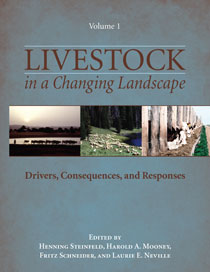"This volume provides an in-depth examination of the present and future challenges of worldwide intensive and extensive livestock production...This work offers insight into the present and future challenges of global livestock production for meeting human nutrition needs and minimizing its impact on biodiversity and the environment. The second volume of this set focuses on specific geographic areas and case studies."
Choice
"The rapidly changing nature of animal production systems, especially increasing intensification and globalization, is playing out in complex ways around the world. Over the last century, livestock keeping evolved from a means of harnessing marginal resources to produce items for local consumption to a key component of global food crisis. Livestock in a Changing Landscape offers a comprehensive examination of these important and far-reaching trends. [...] Volume 1 examines the forces shaping change in livestock produciton and management; the resulting impacts on landscapes, land use, and social systems; and potential policy and management responses."
Cahiers Agricultures
"...the future continues to look bright for [Nebraska]'s livestock industry because global meat production is expected to double its present level by 2050. However, that growth is not without its challenges. According to a new report, Livestock in a Changing Landscape, the growing worldwide demand for meat is likely to have a significant impact on human health, the environment and the global economy in the next 50 years. 'The livestock industry is massive and growing,' said Harold A. Mooney, co-editor of the two-volume report, published by Island Press. [...] Mooney said the report is the first time that 'we've looked at the social, economic, health and environmental impacts of livestock in an integrated way and presented solutions for reducing the detrimental effects of the industry and enhancing its positive attributes.'"
North Platte Telegraph
"This book is a must for all interested in global livestock production trends and especially for policymakers."
African Journal of Range and Forage Science

